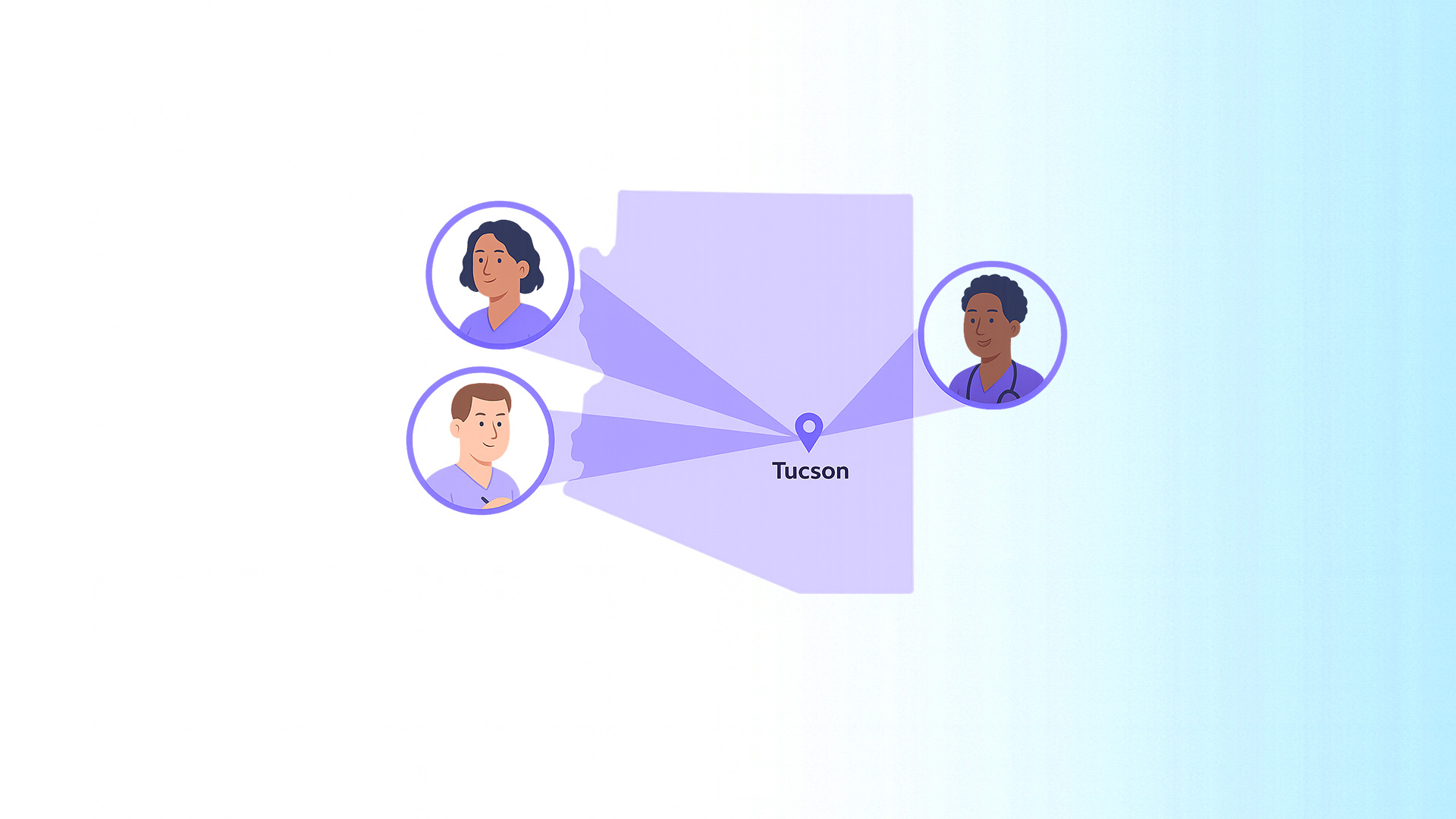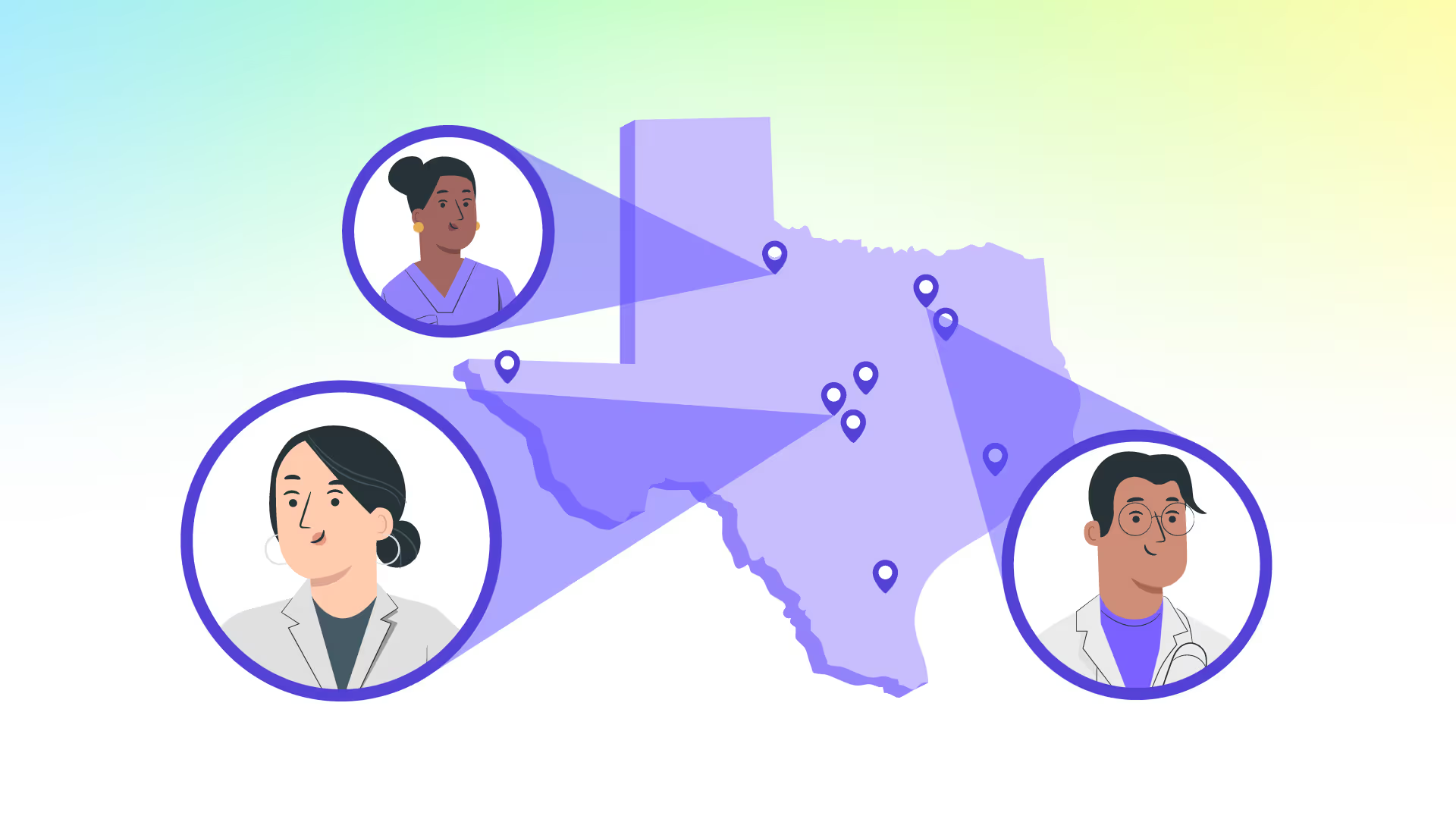The fastest way to secure a Tucson nurse practitioner preceptor is to combine early outreach, organized communication, and access to confirmed clinical opportunities so you never fall behind on your rotation schedule. NP students in Tucson often face limited availability in primary care and mental health, which is why many students use a structured placement resource like NPHub to connect with preceptors who are open, responsive, and ready to support their clinical training.
TLDR: How to Find Tucson Nurse Practitioner Preceptors and Secure Your Clinical Rotations
- Tucson NP students struggle with preceptor shortages because most Arizona NPs work in direct patient care and Tucson only has about seven hundred ten NPs available for all students.
- The University of Arizona supports students through a Clinical Placement Coordinator and contract management, but students still carry most of the responsibility for finding a preceptor.
- Banner Health offers structured student rotation management, but placement depends on clinic capacity and cannot guarantee availability.
- El Rio Health provides an advanced FNP residency program, showing long term support for NPs, although it does not help with student placements.
- If searching on your own has stalled and deadlines are closing in, create your free NPHub account to connect with Tucson preceptors who are open, responsive, and ready to teach.
Starting Your Preceptor Search in Tucson
If you are a Tucson nurse practitioner student, you probably didn’t expect the hardest part of becoming an NP to be finding someone who will let you learn from them.
You knew the coursework would be intense. You knew the exams would take discipline. But no one warned you about the emailing, the waiting, the second-guessing, and the feeling that your entire clinical rotation depends on one person finally saying yes.
Maybe you’ve spent hours searching for primary care or mental health openings. Maybe you’ve reached out to clinic after clinic and heard nothing back. Maybe your faculty members remind you to “start early,” but starting early doesn’t help when sites never respond.
And when you’re trying to manage work, family, bills, and life in general, you don’t have a lot of time to send another round of emails into the void. It is frustrating, exhausting, and honestly discouraging.
Many NP students in Tucson reach that same breaking point, wondering how they are supposed to complete their hands-on experience when every lead feels like a dead end. You want the mentorship, you want the learning, and you are ready for the work, you just need someone who will give you the chance.
Are you tired of sending message after message with nothing to show for it? Create your free NPHub account and see which Tucson preceptors are actually available to take students now, without the long waits or uncertainty.
Before you begin reaching out again, it helps to understand why securing a preceptor in Tucson is so challenging, even when you are doing everything right.
The Real Reasons NP Students Struggle to Find Tucson NP Preceptors
Finding a Tucson nurse practitioner preceptor is challenging because the healthcare environment in Arizona is stretched thin, and the data shows exactly why.
The advanced practice workforce is large, but most of it is concentrated in direct care, which leaves limited room for teaching.
According to the statewide APRN survey, 86.7 percent of all APRNs in Arizona hold Certified Nurse Practitioner licenses and nearly 89 percent work in direct patient care roles. This means the majority of Arizona’s advanced practice workforce spends their time seeing patients rather than supervising students.
When a clinician’s day is filled with high patient volume, documentation requirements, and administrative tasks, it becomes difficult for them to take on mentoring responsibilities.
Staffing problems make things even more difficult. Sixty six percent of APRNs reported moderate or severe staff shortages in their main practice setting during the past two years, which affects clinics across the Tucson region. Clinics that are short staffed often delay or limit student placements because they cannot support the added responsibility of a clinical rotation.
The number of nurses and NPs in Arizona adds another layer of complexity. The Arizona Department of Health Services reports more than 165,000 nurses statewide, including about 110,000 registered nurses, 11,000 licensed practical nurses, and 13,400 nurse practitioners.
A large nursing workforce means many professionals are advancing their education at the same time. When large numbers of NP students begin searching for a clinical placement, the competition increases quickly.
The distribution of NPs across the state creates even more pressure for Tucson students. Arizona employs 4,790 nurse practitioners, but 3,430 of them work in the Phoenix–Mesa–Scottsdale metro, which is more than seventy percent of the entire NP population. Tucson has only 710 NPs, and Flagstaff has just 150.
With such a small group of clinicians in Southern Arizona, there are fewer available preceptors, even though many students in the region need rotations at the same time.
All of these factors combine to create a challenging environment for FNP students, mental health students, and anyone needing a specialty rotation in Tucson.
You can put in the time, reach out to clinics, and follow every recommendation from your faculty, yet still find very few openings. It is not a lack of effort. It is a lack of available people who can take on the responsibility of teaching.
If the system feels overbooked and you want a clearer path to your next rotation, create your free NPHub account and explore Arizona and Tucson preceptors who are available, responsive, and ready to support your training.
With the challenges now clear, the next step is knowing which organizations in Tucson offer support and how they can help you move forward.
Where Can Tucson Nurse Practitioner Students Find Support During Their Preceptor Search
Even though the search for a Tucson nurse practitioner preceptor can feel overwhelming, there are a few local programs that offer structure and guidance to help NP students move forward.
These organizations do not remove the student’s responsibility to find a preceptor, but they do give you support, contract coordination, and a clearer process so you do not feel like you are navigating everything alone.
University of Arizona College of Nursing
The University of Arizona provides one of the most supportive systems in Tucson for students who need help with clinical rotations. Every NP student works with a dedicated Clinical Placement Coordinator, who becomes the main point of contact for anything related to finding and approving a preceptor.
The coordinator helps students identify potential preceptors, processes paperwork, and keeps track of placement status throughout the program. Students are encouraged to check in every month so nothing falls through the cracks.
The preceptor approval process is handled through the coordinator as well. They manage the Preceptor Information Form, send information to potential preceptors, and make sure candidates meet all program requirements before students begin. This support reduces the confusion around approval and gives students a structured path to follow.
The College of Nursing also has a contracts office that handles all clinical site agreements. Students submit a contract request through their coordinator and the office manages the negotiations with clinical sites.
These agreements can take several months, so having a team that oversees the process makes planning much easier. Program coordinators and clinical supervising faculty help students stay aligned with specialty requirements and track progress. Although students still need to identify their own preceptors, the administrative support is strong and consistent.
Banner Center for Health Careers
Banner is one of the largest healthcare systems in Arizona and their Center for Health Careers manages student rotations across all Banner locations, including those in Tucson.
Their team serves as a central hub for coordinating clinical education, which means NP students may have access to a variety of clinical settings depending on availability.
Banner partners with academic institutions and manages all student experiences within the health system. This structure provides clear pathways for students who want an organized rotation process rather than contacting individual clinics.
They also oversee education assistance programs and career development initiatives that support the growth of future clinicians. Banner placements still depend on capacity, but their coordinated system helps reduce the guesswork for NP students searching for potential sites.
El Rio Health
El Rio Health offers a program that does not directly support NP students seeking preceptors but is valuable for those planning their careers.
Their Family Nurse Practitioner Residency Program is designed for new graduates who want advanced clinical training after completing their NP degree. This residency includes dedicated preceptorship with an assigned clinician, specialty rotations, mentored clinics, weekly education sessions, and ongoing professional development.
While this program is for graduates rather than students completing rotations, it shows El Rio’s commitment to training NPs and supporting long term success in community health.
Tucson students often feel like they have nowhere to turn during their search, but these organizations offer real structure and support. They do not guarantee a preceptor, yet they give you a starting point, reliable contacts, and systems that make the process less confusing.
If these resources still leave you searching and you want a faster, more predictable way to secure your rotation, create your free NPHub account and explore Tucson preceptors who are open, available, and ready to support students without long delays or complicated steps.
Once you know where support exists, the next decision is understanding when it makes sense to use additional help to stay on track.
How can NPHub Your Tucson Clinical Rotations Search
There comes a moment in every NP student’s journey when the search takes over your entire routine. What starts as a simple task slowly becomes the thing you think about every morning on your way to work and every night when you finally sit down after a long week.
You reach out to clinic after clinic in Tucson, hoping that someone will respond. You send another request, write another message, check your inbox again, and still nothing.
It is draining to keep searching for a preceptor while managing your job, your classes, your family, and the rest of your life. Most nurse practitioners in Southern Arizona spend their days providing direct patient care in primary care, mental health, wellness, and other busy specialties, which means they often have very little room to take on students.
This shortage is not a reflection of the student’s effort. It is the reality of the state’s healthcare workload and the limited number of available preceptors in Tucson.
As deadlines approach, the pressure grows. You start worrying about whether you will be able to complete your clinical rotation on time.
Your faculty members want to support you, but most programs in Arizona expect students to handle their own preceptorship search. You can follow every tip they recommend, but if local clinics are full or overwhelmed, your progress still slows down.
Many MP students describe feeling guilty or anxious during this period, even though they have done everything right. The emotional weight increases when you realize you cannot afford to lose a semester, and the stress begins to touch every part of your day.
You try to stay focused on your graduate program, but it is hard to concentrate when your entire rotation still depends on finding one person who is open and ready to teach.
This is the point where NPHub becomes more than a service. It becomes support. Instead of spending a lot of time reaching out blindly, you step into a system that already has Tucson nurse practitioner preceptors who are open to students and prepared to offer real mentorship.
You move from uncertainty to clarity, from constant searching to an organized approach where availability, expectations, and site requirements are already addressed.
The benefit is simple. You gain a path forward that does not pull you away from your life, your studies, or your work. You get to focus on your training instead of the endless hunt for a clinical rotation.
And you finally get the opportunity to build the experience you need to confidently enter practice.
If the search has taken too much of your time and you want a placement that is clear and reliable, create your free NPHub account and explore Arizona and Tucson preceptors who are ready to support NP students right now.
With your rotation secured, the next step is preparing to finish strong and make the most of your time in the clinic.
Stepping Into Your Rotation With Confidence and a Clear Plan
Once you finally secure your clinical rotation in Tucson, everything starts to feel different. The pressure that followed you through the searching phase begins to ease, and you can shift your attention back to what truly matters.
You can focus on building the confidence, skill, and clinical judgment that will carry you into your first job as a nurse practitioner.
Finishing strong begins with preparation. Review your rotation details, confirm your schedule, and communicate clearly with your preceptor so both of you know what to expect. Tucson offers a variety of clinical settings, from primary care clinics to community-focused mental health practices, wellness centers, and specialty areas depending on your program.
Each site gives you the chance to work with diverse patient populations and learn how to manage real clinical challenges at a level that textbooks cannot prepare you for.
Tucson offers students a special advantage. The city’s clinical settings allow you to work closely with patients who need thoughtful, compassionate care. You gain a deeper understanding of wellness, chronic disease management, and culturally responsive practice. Whether you are an FNP student or focusing on a specific specialty, this is where your training becomes real.
Graduation and licensure start to feel closer when your rotation is secure. The uncertainty settles, and you can focus on your work rather than worrying about whether you will complete your hours on time. Many students say this is the moment they finally feel like they are stepping into the role they have been working toward from day one.
If you have reached this stage, you deserve to be proud of yourself. The search was not easy. Life did not pause for you. You managed family, work, school, and a stressful placement process. Now you have the chance to build the experience that will shape your career and prepare you for independent practice.
If you want every rotation to feel this steady and supported from the start, create your free NPHub account and secure your NP preceptor so you can move forward without delays or last minute stress.
Frequently Asked Questions: Finding NP Preceptors in Tucson, AZ
1. How can I find a Tucson nurse practitioner preceptor for my clinical rotation?
Most NP students in Tucson start by reaching out to local clinics, community health centers, and primary care offices. Some contact mental health providers depending on their specialty. Because not every clinic accepts students, many students eventually use a preceptor matching service to secure a placement with less uncertainty. NPHub lets you connect with Tucson preceptors who are open, responsive, and familiar with NP program requirements.
2. Which clinical sites in Tucson usually take NP students?
Tucson offers opportunities in primary care, internal medicine, pediatrics, women’s health, wellness care, and mental health. Settings may include private practices, group clinics, community health organizations, and certain specialty offices. Availability depends on the time of year, staffing levels, and how many students are already placed.
3. How early should I begin my search for a clinical rotation?
Most students start at least three to four months before their rotation begins, although some programs recommend beginning much earlier. Tucson has a smaller number of available preceptors compared to Phoenix, which means placements can fill quickly. Starting early gives you more choices and a smoother approval process with your faculty.
4. Does the University of Arizona help NP students find preceptors?
The University of Arizona College of Nursing provides strong administrative support through their Clinical Placement Coordinator, who assists with approvals, contracts, and communication. Students still need to identify potential preceptors themselves, but the coordinator helps with the paperwork and ensures each site meets program requirements.
5. What specialties are hardest to secure in Tucson?
Primary care and mental health tend to be the most competitive because many students need these rotations and Tucson has a limited number of providers. Specialty areas such as pediatrics, wellness, and chronic disease management may also be challenging during busy months or summer terms.
6. Can I complete all my clinical hours at one site?
This depends on your NP program and your specialty focus. Some programs allow students to stay with one preceptor for multiple rotations, while others require different sites to ensure a wide range experience. Faculty approval is always required before continuing at the same clinic.
7. What makes NPHub helpful for Tucson NP students?
Most students come to NPHub after spending a lot of time searching on their own. NPHub connects you with Tucson nurse practitioner preceptors who are already prepared to teach, which reduces the stress of managing outreach, scheduling, and uncertainty. This is especially helpful when deadlines approach or when your specialty needs cannot be met through cold calling alone.
8. How much time should I expect the search to take in Arizona?
The timeline varies, but many students say it takes several weeks to even get a response from local clinics. Tucson providers often have limited availability, so the search can take longer than expected. Using a matching service can shorten the process and help you secure a rotation without losing time.
9. Are preceptors allowed to decline students?
Yes. Preceptors can decline based on workload, full schedules, clinic capacity, or lack of specialty fit. Declines are common in Arizona because many providers are balancing heavy patient loads and do not have the time to train a student during a busy rotation period.
10. What documents should I prepare before contacting potential preceptors?
Most clinics expect a resume, proof of liability insurance, immunization records, and any required school forms. Preparing these ahead of time helps show professionalism and allows your preceptor to approve your placement faster once they agree to work with you.
Key Definitions for Tucson NP Students
- Clinical Rotation
A required period of supervised practice where NP students apply what they have learned in class to real patient care. Rotations help you develop confidence, clinical reasoning, communication skills, and the hands on experience needed for graduation and licensure. - Clinical Preceptor
A licensed nurse practitioner or qualified healthcare provider who mentors and supervises a student during their rotation. A preceptor teaches clinical skills, guides decision making, reviews documentation, and evaluates progress throughout the experience. - Preceptorship
The structured relationship between an NP student and their preceptor. A preceptorship helps students develop their practice style, learn to manage patient visits, and understand how to move through a clinical day at a professional level. - Clinical Placement
The process of securing a site and preceptor for your rotation. This includes finding a qualified provider, gaining faculty approval, completing paperwork, and meeting all requirements set by your NP program and the clinical site. - Specialty Rotation
A clinical experience focused on a specific area such as primary care, mental health, pediatrics, or women’s health. Specialty rotations provide focused training that helps students build advanced skills tailored to their future practice interests.
About the author
- NPHub Staff
At NPHub, we live and breathe clinical placements. Our team is made up of nurse practitioners, clinical coordinators, placement advisors, and former students who’ve been through the process themselves. We work directly with NP students across the country to help them secure high-quality preceptorships and graduate on time with confidence. - Last updated
November 13, 2025 - Fact-checked by
NPHub Clinical Placement Experts & Student Support Team - Sources and references
- https://azbn.gov/sites/default/files/APRN-Compact-Survey-Results-Arizona-2022.pdf
- https://directorsblog.health.azdhs.gov/nurses-are-vital/
- https://www.nursingprocess.org/how-many-nurse-practitioners-are-there-in-the-us.html
- https://nursing.arizona.edu/resources/dnp-clinical-placements
- https://www.bannerhealth.com/health-professionals/for-students
Find a preceptor who cares with NPHub
Book a rotation.webp)








.webp)


.webp)



%20(3)%20(2).svg)
.webp)